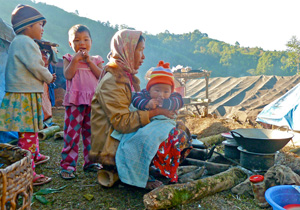MYANMAR: Cross-line NGOs in Kachin need support
Local NGOs in northern Myanmar with access to both sides of an ongoing conflict between government forces and the Kachin Independence Army (KIA) are playing a key role in addressing the needs of thousands of displaced.

Thousands of displaced remain in need
There are four local cross-line Burmese NGOs and community-based groups: Karuna Myanmar Social Services (KMSS), the Metta Development Foundation, the Kachin Baptist Convention (KBC) and the Shalom Foundation.
“We are working between two warring parties - this is the biggest challenge we face,” Win Tun Kyi, programme coordinator for KMSS, a faith-based group affiliated with the Catholic Church, told IRIN.
“It’s already been 10 months [of being displaced] - these people have suffered too much,” said Sai Sam Kham, executive director of Metta, citing food, shelter, water and sanitation, and psychosocial support as the primary needs.
The UN estimates that up to 55,000 people have been displaced by fighting inside Myanmar between government forces and the KIA, since the collapse of a 17-year ceasefire between the two sides in June 2011.
The KIA has been fighting for greater autonomy from the country’s central government since 1961.
Around 20,000 of the displaced are living in government-controlled areas, up to 35,000 more are in KIA-controlled areas; mostly in camps, and another several thousand are believed to be staying with host families across the border in China.
Access
Despite the numbers, humanitarian access for international agencies, including the United Nations, is problematic.
Displaced people in government-controlled areas receive better levels of assistance because the UN and international agencies can reach them more easily, but the same cannot be said of KIA-controlled areas near the Chinese border where most of the displaced now are, which prompted the UN to again press for sustained access at the end of March.
These constraints further underscore the importance of local NGOs that have access to both sides, international aid workers say.
“Although they have received little support from the international community, local NGOs have negotiated access to the areas of greatest need and delivered life-saving humanitarian assistance,” noted John Prideaux-Brune, country director of international aid agency Oxfam.
“It’s not just about providing emergency relief. The fact that these groups can work with both sides will ultimately help in bringing about peace,” said Shihab Uddin Ahamad, country director of ActionAid Myanmar.
Others cite the nuanced yet non-political understanding that local groups have regarding the situation inside Kachin, and their strong relationships with the communities concerned.
“These are strengths that neither UN nor INGOs [international NGOs] can currently provide. As such, all resources should be channelled to support NGOs in their efforts, regardless of where they operate from,” said another aid worker.
So far it isn’t happening, which could have an impact ahead of the rainy season starting in May.
“Right now our key challenge is funding, said Metta’s Sai Sam Kham, warning that given current funding constraints, they may have to pull out of KIA-controlled areas.
“From the beginning of this conflict we have had access to both sides,” he said “Despite that, the response from international agencies in supporting local groups like ours has been very slow.”
Source: IRIN
- 546 reads
Human Rights
Fostering a More Humane World: The 28th Eurasian Economic Summi

Conscience, Hope, and Action: Keys to Global Peace and Sustainability

Ringing FOWPAL’s Peace Bell for the World:Nobel Peace Prize Laureates’ Visions and Actions

Protecting the World’s Cultural Diversity for a Sustainable Future

Puppet Show I International Friendship Day 2020

